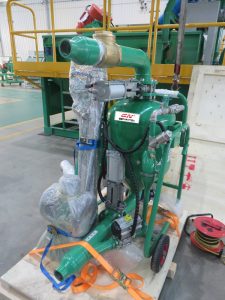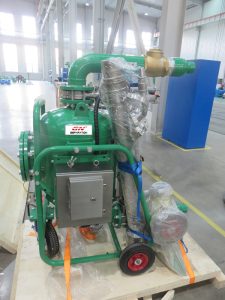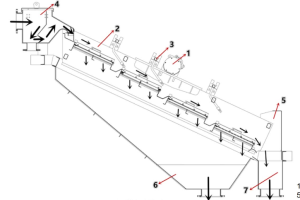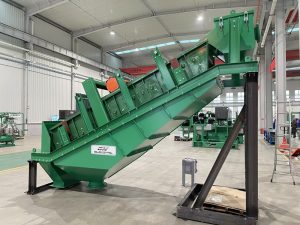The Middle East has long been known for its pomegranate production, and the demand for efficient conveyance of pomegranate powder has been on the rise. In response to this demand, the application of GN vacuum pump has emerged as a groundbreaking solution, revolutionizing the conveyance process. This article aims to delve into the details of this innovative application and its impact on the pomegranate industry in the Middle East.
1 Introduction to Vacuum Pump Applications
Vacuum pumps are versatile tools that find applications in a wide range of industries, playing a crucial role in optimizing production processes. These pumps operate by removing gas molecules from a sealed volume to create a partial vacuum, thereby enabling various mechanical and chemical processes. The significance of vacuum pump applications lies in their ability to facilitate the transportation of materials, create controlled environments, and support essential industrial operations.
In the context of material transportation, vacuum pumps are extensively used for conveying powders, granules, and other solid materials in industries such as food processing, pharmaceuticals, and chemical manufacturing. The application of vacuum pumps in conveying pomegranate powder in the Middle East exemplifies their role in enabling the efficient transfer of delicate and valuable materials. By utilizing a vacuum pump system, the pomegranate powder can be transported with minimal risk of contamination or degradation, ensuring the quality and integrity of the product throughout the conveyance process.
Moreover, vacuum pumps play a crucial role in creating controlled environments for various industrial processes. In the pharmaceutical industry, for example, vacuum pumps are utilized to establish aseptic conditions in the production of medicines and vaccines. By removing air and other impurities from the production environment, vacuum pumps contribute to maintaining the sterility and purity of pharmaceutical products, thus ensuring their safety and efficacy. Similarly, in the semiconductor manufacturing industry, vacuum pump applications are essential for creating clean and controlled environments that are free from contaminants, enabling the precise fabrication of microchips and electronic components.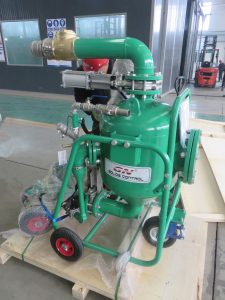
The significance of vacuum pump applications also extends to their support of essential industrial operations, particularly in the field of energy production. Vacuum pumps are integral components in the extraction of natural resources such as oil and gas, where they are utilized in processes such as vapor recovery, gas compression, and well dewatering. By enabling the efficient extraction and processing of these resources, vacuum pumps contribute to the overall productivity and sustainability of the energy industry, highlighting their essential role in supporting vital global supply chains.
In addition to their role in material transportation, controlled environment creation, and support of industrial operations, vacuum pump applications are also characterized by their originality and versatility. The innovative utilization of vacuum pumps in diverse industries and processes reflects the continuous evolution and adaptation of this technology to meet new challenges and demands. From the development of specialized vacuum pump systems for unique material handling requirements to the integration of advanced control and monitoring technologies, the originality of vacuum pump applications is evident in their ability to address complex industrial needs with tailored solutions.
In summary, the diverse applications of vacuum pumps in material transportation, controlled environment creation, industrial operations, and their originality and versatility underscore their significance in optimizing production processes across various industries. As demonstrated by the innovative application of GN vacuum pump in the conveyance of pomegranate powder in the Middle East, vacuum pump applications continue to play a pivotal role in enabling efficient, reliable, and innovative solutions for complex industrial challenges.
2 Conveyance of Pomegranate Powder
The conveyance of pomegranate powder presents unique challenges due to the powder’s fine and abrasive nature. Traditional conveying methods such as screw conveyors or belt conveyors are often ineffective and prone to issues such as clogging, material degradation, and inefficient powder transfer. In order to streamline the conveyance process and maintain the quality of the pomegranate powder, innovative solutions are required. This section will delve into the specific challenges associated with the conveyance of pomegranate powder and explore the need for original and effective conveying technology to address these challenges.
One of the primary challenges in conveying pomegranate powder is its propensity to form clumps and agglomerates. This can occur due to the powder’s hygroscopic nature, which causes it to absorb moisture and form lumps. Additionally, the fine particles of the powder can easily become airborne during traditional conveying methods, leading to dust generation and potential health hazards for workers. These challenges not only affect the efficiency of the conveying process but also impact the quality of the pomegranate powder, leading to potential product wastage and financial losses for manufacturers.
Another significant challenge is the abrasive nature of pomegranate powder, which can cause excessive wear and tear on traditional conveying equipment. The abrasive particles can cause erosion and damage to the surfaces of conveyors, leading to increased maintenance costs and downtime for equipment repair. Moreover, the abrasive nature of the powder can result in contamination issues if the conveying equipment is not designed to handle such materials effectively. This further emphasizes the need for specialized conveying technology that can withstand the abrasive characteristics of pomegranate powder while ensuring efficient and hygienic transfer.
Furthermore, the flow properties of pomegranate powder present a challenge in terms of maintaining a consistent and uniform flow during conveying. The powder’s cohesive and adhesive properties can lead to uneven flow patterns, causing irregular discharge and potential blockages in the conveying system. This not only hampers the overall efficiency of the conveying process but also poses sanitation and hygiene concerns, especially in food and pharmaceutical applications where cleanliness is paramount. Addressing the flow properties of pomegranate powder is crucial in ensuring smooth and reliable conveying without compromising the integrity of the product.
In conclusion, the conveyance of pomegranate powder poses several intricate challenges related to its hygroscopic, abrasive, and cohesive nature. These challenges necessitate the development of original and specialized conveying technology that can effectively mitigate issues such as clumping, abrasion, and inconsistent flow. By addressing these challenges, manufacturers can streamline the conveying process, minimize product wastage, and uphold the quality and integrity of the pomegranate powder during transportation and handling.
3 Mechanical Principles and Market Applications
The mechanical principles behind the GN vacuum pump are crucial to understanding its unique advantages and specific applications in the conveyance of pomegranate powder. The GN vacuum pump operates based on the principle of creating a vacuum environment within the pump chamber, which allows for the suction and conveyance of materials without the need for mechanical parts that may cause contamination or damage to the product.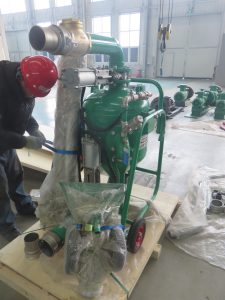
One of the key mechanical principles at play in the GN vacuum pump is the use of positive displacement. This principle ensures a consistent and precise conveyance of pomegranate powder, as the pump effectively traps a fixed amount of the powder in each pump chamber and moves it along the conveying pipeline. This results in a smooth and continuous flow of the powder, without the risk of clogging or uneven distribution. The positive displacement mechanism also contributes to the pump’s ability to handle the powder gently, preserving its integrity and quality throughout the conveying process.
Furthermore, the GN vacuum pump utilizes the principle of air compression to enhance the conveyance of pomegranate powder. As the pump creates a vacuum within the chamber, the pressure difference between the chamber and the conveying pipeline causes the powder to move from an area of higher pressure to an area of lower pressure. This effectively propels the powder through the pipeline, allowing for efficient and controlled conveyance without the need for excessive force or agitation. The use of air compression ensures that the powder is conveyed with minimal disruption, reducing the risk of degradation or contamination.
In addition to these mechanical principles, the GN vacuum pump is designed with a focus on minimizing the risk of product contamination and ensuring hygienic conveying processes. The pump features smooth and seamless internal surfaces, which prevent the accumulation of powder or residue that could lead to contamination. This design consideration aligns with the stringent quality standards required for food and pharmaceutical applications, making the GN vacuum pump an ideal choice for conveying pomegranate powder in the Middle East.
Moving on to the market applications of the  in the conveyance of pomegranate powder, its unique mechanical principles make it well-suited for a range of industries. In the food and beverage sector, the pump’s ability to handle delicate powders with precision and care is particularly valuable. Whether it is used in the production of pomegranate-flavored beverages, the creation of pomegranate-based confectionery, or the incorporation of pomegranate powder into culinary recipes, the GN vacuum pump offers a reliable and efficient solution for conveying this valuable ingredient.
in the conveyance of pomegranate powder, its unique mechanical principles make it well-suited for a range of industries. In the food and beverage sector, the pump’s ability to handle delicate powders with precision and care is particularly valuable. Whether it is used in the production of pomegranate-flavored beverages, the creation of pomegranate-based confectionery, or the incorporation of pomegranate powder into culinary recipes, the GN vacuum pump offers a reliable and efficient solution for conveying this valuable ingredient.
Moreover, the pharmaceutical industry also benefits from the application of the GN vacuum pump in the conveyance of pomegranate powder. The pump’s ability to maintain product integrity and prevent contamination aligns with the rigorous standards of pharmaceutical production. Whether it is used in the manufacturing of pharmaceutical formulations or the production of nutraceutical products containing pomegranate powder, the GN vacuum pump ensures the hygienic and precise conveyance of this valuable ingredient.
The unique combination of mechanical principles and market applications positions the GN vacuum pump as a versatile and effective solution for the conveyance of pomegranate powder in the Middle East. Its ability to maintain product integrity, prevent contamination, and ensure precise conveying aligns with the stringent requirements of the food, beverage, and pharmaceutical industries, making it a valuable asset for businesses seeking to incorporate pomegranate powder into their products.
In conclusion, the application of GN vacuum pump in the conveyance of pomegranate powder has not only optimized the production process but also opened up new possibilities for the utilization of pomegranate resources in the Middle East. As the industry continues to evolve, the integration of advanced technologies such as the GN vacuum pump is expected to further enhance efficiency and productivity.
